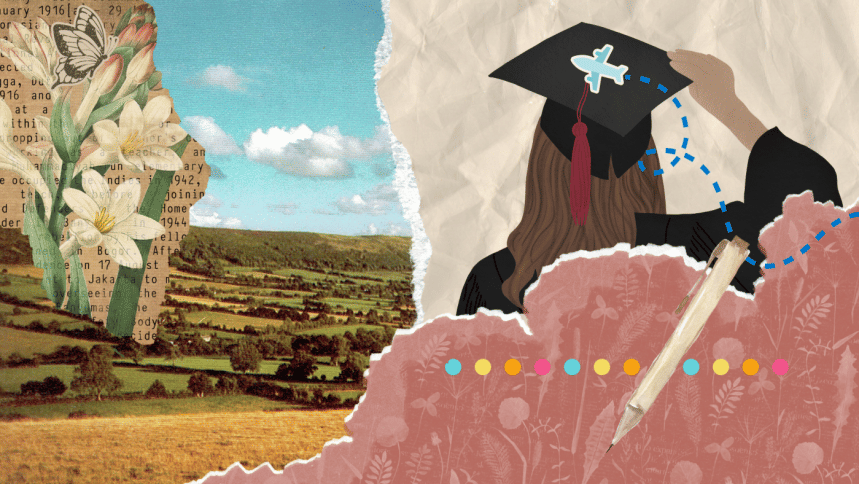Semester abroad as an undergraduate student: The prospects and challenges

Studying abroad for a semester can be a life-changing experience for students as it allows them to experience life in a completely different place. While this practice is yet to become widespread in Bangladesh, there are a few programmes that offer Bangladeshi students the opportunity to study abroad for a semester under different international collaborations.
Tanfia Khan Disha, a student of Biochemistry and Biotechnology at Independent University, Bangladesh (IUB), completed a semester abroad under the Erasmus Exchange Program. The programme, funded by the European Union (EU), allows students from the EU and associated countries to study abroad for one to two semesters. During the programme, Tanfia was placed at the University of Maribor in Slovenia.
In Maribor, she experienced a robust academic culture, which was guided by discipline and apt resources, something that is not always accessible in her home institution. Recollecting her experience, Tanfia said, "Initially I was taken aback by the culture of punctuality in Slovenia. Classes started on time and we were not allowed to be late at all. It pushed me to be more disciplined in terms of academics. Besides, academic standards were higher without being excruciatingly overbearing."
Tanfia feels that her host institution applied the approach of positive reinforcement. She pointed out, "In Maribor, if someone fails to get their expected result, they will be able to sit for the exam as many times as they prefer, and only the best mark out of these will be counted. So, they do not need to stress themselves at the prospect of retaking a course."
While Tanfia's experience highlights the academic rigour and cultural discipline in Europe, Adiba Islam Tamim's journey in the United States sheds light on the personal growth and social challenges that exchange students tend to face. Adiba, a Disaster Management major from Dhaka University, studied a semester abroad through the Global UGRAD Program at Southeast Missouri State University which was sponsored by the United States Department of State. She credited the programme for having a transformative impact on her overall personality.
Adiba explained, "The programme has made me a whole new person. First, I had to stay there all alone without any parental supervision and I got to do many things for the first time by myself which included a lot of travelling, opening a bank account, and booking a hotel. All these experiences have allowed me to become more confident in myself. Besides that, I feel that due to my experience there, I have grown to become a more empathetic person. Now, I try to put myself in the shoes of another person while thinking about any issue."
However, things have not always been easy for Adiba. As a Bangladeshi foreign student, she has faced exclusion from group projects in certain classes. She said, "Sometimes, I'd notice local students forming groups within themselves. Foreign students from other South Asian countries would also collaborate within their demographic. As a result, I felt left out. I also felt that some people assumed that I would have certain biases based on my religious beliefs."
Like Tanfia and Adiba, Wasif Kayum, a student of Economics from BRAC University, also experienced a unique academic culture during his semester abroad. Wasif completed a semester abroad at Central European University (CEU) in Austria, through the OSUN Undergraduate Student Mobility opportunity, organised by the Open Society University Network (OSUN).
This programme allows students to complete a semester in one of the partner foreign universities of OSUN. While participating in the programme he found himself to be fascinated with the academic culture of Europe as he felt it is more oriented toward application and practicality. He said, "In CEU, academics are more centred around assignments rather than quizzes and exams. Consequently, I was able to focus more on research which improved my critical thinking abilities. Along with that, I liked the practice of weekly class discussions, where within a close-knit group, students were able to discuss the application of economics with the course instructor."
Nonetheless, he emphasised that students practice being more conscious regarding their choice of course in host institutions. "It is extremely important to check if the courses you are choosing at your host university have equivalent courses back at the home institution. Otherwise, the credits you have earned from the study abroad programme will not be helpful in terms of the course count at your home institution," cautioned Wasif.
In spite of providing a plethora of development and challenging opportunities, Bangladeshi students tend to face some drawbacks in their home institutions due to systemic inflexibility regarding credit transfer procedures. In public universities, students may not be able to transfer their credits from foreign institutions.
As Adiba stated, "I will not be able to transfer any credits from Kent State University to my university, which will only prolong the duration of my undergraduate degree."
Although private universities are more flexible in terms of the credit transferring process, the process can still be complicated.
As Wasif stated, credits earned from CEU will not be added until the eleventh hour of his undergraduate degree, which creates complications for him during the advising period. "My university will add the credits right before my graduation, which lowers the number of credits I have completed. As a result, sometimes, signing up for certain courses becomes difficult as people with more credits get to do their advising before I can," he explained.
Needless to say, studying abroad for a semester can present enormous prospects through cross-cultural learning experiences. However, the lack of flexibility to transfer credits back home might create some difficulties. While choosing to apply for these programmes, an applicant should weigh in all these factors and make their decision based on what caters best to their long-term academic and career goals.
Fariha Lamisa is a chronic procrastinator and a struggling student. She is praying to be a graduate by catastrophe. Please send your consolation via email to [email protected]

 For all latest news, follow The Daily Star's Google News channel.
For all latest news, follow The Daily Star's Google News channel. 










Comments